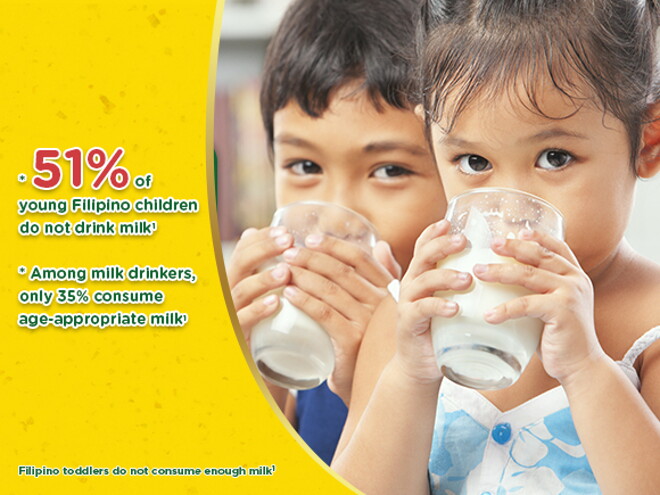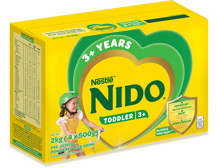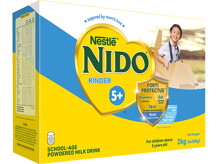
What’s the right milk that can help give my toddler total protection?
Maria Katrina Florcruz, MD, DPPS
One important source of energy, protein, and nutrients among toddlers is milk.
Toddlerhood is a stage of rapid growth, development, socialization, and exploration. This is also the period where the right balance of nutrition for age plays a key role in brain development, immunity, physical growth, and total protection. One important source of energy, protein, and nutrients among toddlers is milk.
Why focus on toddler nutrition?
Toddler nutrition impacts overall health. In the Philippines, undernutrition and micronutrient deficiency among kids below 5 years old continue to be a problem. Giving age-appropriate nutrition with adequate micro- and macronutrients guarantees protection for healthy growth.2

The role of age-appropriate milk
Consuming milk based on the appropriate nutritional guidelines can provide the essential nutrients to a toddler’s diet. Toddler milk is expertly formulated to meet the child’s nutritional needs for his age. 1,5
Below are the essential nutrients provided by the right milk:
- Protein – Provides the building blocks for the body and for growth and development of bones and muscles7
- Calcium – For muscle development and strong bones and teeth7
- Vitamin C and Zinc – Supports immunity and normal skin development7
- Iron and Folate – Supports brain development, blood health, overall growth, and immunity8
- Vitamin A – Has essential roles in vision, immunity, and the formation of organs and bones8
- B Vitamins – Supports the gut and the nervous system7
Toddler milk is fortified with nutrients for added protection. For instance, Linoleic Acid (LA), Alpha-Linolenic Acid (ALA), and DHA support brain development and help keep toddlers mentally alert.1,4 In addition to this, probiotics such as L.Rhamnosus may also help lessen the risk of respiratory diseases, including coughs and colds which can be reduced by as much as 38%. Thus, this can help your toddler be less sickly.6
Studies show that toddlers who consume age-appropriate milk have improved nutrient intakes of iron, zinc, folate, magnesium, potassium, and Vitamins B, C, D, and E compared to non-milk drinkers. Age-appropriate milk also helps improve height and weight gain along with iron status.1
Children aged 3 to 5 years old are usually very active as they undergo rapid growth and development, and therefore have high nutritional needs. Age-appropriate milk is an important part of a toddler’s diet as it contributes to better micronutrient intake and improves nutrient adequacy. By giving the right milk for age, toddlers are given total protection to support them as they grow, develop and explore.
References:
- Mak, Tsz-Ning, et al. Contribution of Milk Beverages to Nutrient Adequacy of Young Children and Preschool Children in the Philippines. Nutrients. 2020;12:392
- Reverri E, et al. Young Child Nutrition: Knowledge and Surveillance Gaps across the Spectrum of Feeding. Nutrients. 2022 Aug;14(15):3093.
- Suthutvoravut U, et al. Composition of Follow-Up Formula for Young Children Aged 12–36 Months: Recommendations of an International Expert Group Coordinated by the Nutrition Association of Thailand and the Early Nutrition Academy. Ann Nutr Metab. 2015;67:119–132.
- Verducci, et al. Which Milk during the Second Year of Life: A Personalized Choice for a Healthy Future? Nutrients 2021;13:3412.
- Allen R, Myers A. Nutrition in toddlers. Am Fam Physician. 2006 Nov 1;74(9):1527-32.
- Hojsak I et. Lactobacillus GG in the prevention of gastrointestinal and respiratory tract infections in children who attend day care centers: A randomized, double-blind, placebo-controlled trial. Al Clin Nutr. 2010;29(3):312-316.
- Raisingchildren.net.au Resources Page. 2022. Vitamins and minerals for kids and teens. Accessed February 10, 2022. Available from: https://raisingchildren.net.au/teens/healthy-lifestyle/nutrients/vitami…
- Bailey RL, et al. The Epidemiology of Global Micronutrient Deficiencies. Ann Nutr Metab, 2015;66(suppl 2):22–33.











